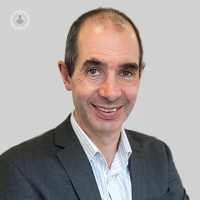How might ulcerative colitis develop over time?
Written in association with:Ulcerative colitis is a condition that affects one’s bowel habits and bowel movement frequency, and is thought to occur as a result of our own immune system attacking bacteria in the colon, leading to inflammation.
Here to explain how patients with ulcerative colitis can monitor the condition, and what treatment options are available, is highly esteemed gastroenterologist and endoscopist, Dr John Martin.

What causes ulcerative colitis?
The causes are not entirely known, but there are certain factors that are important. The most accepted theory is an abnormal immune response to bacteria in the colon. In ulcerative colitis, the immune system responds to the bacteria, which eventually leads to inflammation of the colon. Genetic factors can also increase an individual’s chances of suffering from ulcerative colitis.
What lifestyle changes do you advise a patient with ulcerative colitis to make?
There isn't actually very much that patients need to do necessarily in terms of monitoring their lifestyle. It is sometimes advised that patients (in some cases) avoid refined foods.
How can patients expect the condition to develop over time?
It is a chronic condition, and is quite variable. Some patients will have troublesome problems, whilst others will only experience a manageable attack every once in a while. There are certain factors that predict a difficult outcome. Patients who have an early onset of ulcerative colitis often have more trouble in the future compared to patients who develop it later in life.
How can patients track their symptoms to monitor the condition?
It really is a matter of looking out for the early signs. The classic symptoms include diarrhoea, blood in the stool, as well as abdominal pain prior to going to the toilet. It is important that patients identify these symptoms early, so that adequate medication can be distributed.
What treatment options are available for patients with ulcerative colitis?
Anti-inflammatory drugs are highly effective when it comes to treating ulcerative colitis. A course of steroids may be given to the patient if anti-inflammatory drugs are not effective.
There are also a variety of effective biological therapies that have become available over the last 10 to 15 years. These try to dampen down the immune response. These can either be given through injections or various oral medications.
If medical therapy fails, then ultimately, there is an option to remove the colon surgically. Some patients can have a pouch, which is a reconstruction of the rectum.
Does the condition put patients at risk from further complications if left untreated?
Many patients with ulcerative colitis will suffer from eye inflammation, joint pain, skin rashes, as well as liver problems. Some patients have associated liver disease, which can be progressive, and, in some cases, quite severe. Patients’ colon can dilate up and bleeding can occur.
If left untreated in the long-term, patients are at a high risk of suffering from colon cancer.
Dr John Martin is a highly proficient London-based gastroenterologist and endoscopist who can help you when it comes to treating and diagnosing ulcerative colitis. Schedule a consultation with him today via his Top Doctors profile.


